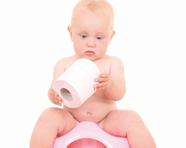Elimination Communication; a Canadian Perspective

Hey mommy, no more diapers!
Elimination Communication; a Canadian Perspective
My son has a special way of communicating that he wants to go to the toilet – by a certain expression on his face. ‘So what?’ you think. ‘Wait,’ I say, ‘he is only eight months old and has been ‘going’ in the wash basin in the bathroom since he was a few days old.’
“He doesn’t like to go in his diaper,’ I say to everybody’s amazement. “You’ve started to toilet train your newborn son? Already? That’s unbelievable!” Unbelievable but true.
Most parents complain that they cannot sleep through the night as they wake up to feed their child. However, not only do I have to wake up twice in the night to nurse my son but my husband wakes up twice in the night to take him to the bathroom. The term used is Elimination Communication (EC), devised by Ingrid Bauer, author of ‘Diaper Free! The Gentle Wisdom of Natural Infant Hygiene’ (Natural Wisdom Press, 2001). EC is still a relatively new concept, slowly gaining popularity with parents in the Western world who had previously not heard about it or were not willing to accept it.
EC has been practiced in many different countries of the world, especially in the East Indian region, where washing the infant with water as opposed to wipes is the norm; so is wearing cloth nappies, instead of disposable diapers. This leads to infants being taught about toilet training from a much earlier age.
At what age do you start?
The Canadian Pediatric Society views on toilet training are that by the time a child reaches 18 months of age they are ready for bowel and bladder control. (Canadian Pediatric Society, Toilet Learning Pamphlet; http://www.cps.ca).
However, Laurie Boucke, author of the books, Infant Potty Training and Infant Potty Training Basics (White-Boucke Publishing, 2002), says “a normal, healthy infant is indeed aware of the bodily function of elimination and can learn to respond to it from infancy.” She goes on to say that babies are smarter than we think and they are able to communicate their need to eliminate but that we do not understand them. Soon they forget and think it is fine to go in their diaper and then we have to start the process of toilet training them at a later age. Boucke recommends that the best time to start toilet training is between 0 and 6 months.
Norisa Anderson, North Vancouver, BC, was eager to meet her son’s elimination needs right from birth. “I hovered day and night like a mommy cat, and with much more enthusiasm than skill managed a score in the toilet by a couple weeks.” Zoe MeEnry, Edmonton started toilet training her son at three months.
A daycare worker in Surrey, BC with 25 years work experience has said that they start training children at 18 months. This was worrying to me as a mother, with a partially toilet trained baby. I made inquiries and have found a child care worker who will look after my son’s elimination needs during the daytime when I am at work.
Observe and Time
My son gets extremely fussy beforehand and does not go to sleep even if he is very sleepy. I know this is my cue to take him and voila! He then just turns over and goes to sleep by the time I get his diaper on again.
Zoe says: “Currently my son is ‘pre-wetting’ many diapers, and then finishing in the pot although he never has a bowel movement outside of the house. The biggest problem has been that he doesn’t signal so we have to rely on timing.” Where do they go?
For infants the potty is too big, so some mothers find that holding their baby over a bucket instead of the toilet works better for them. My son goes in the wash basin in the bathroom.
Norisa says that she used to feel awkward when arriving as guest somewhere and having to ask to use the washroom before greeting everyone. “I solved the problem by giving him a chance to water a bush before arriving.”
Association Boucke suggests that when you anticipate that the baby wants to go then make sure you make a sound that they will associate with elimination such as ‘shhhhhhh.’ This conditions the baby for a response of elimination to the sound.
Time Constraints EC requires time and effort. Most mothers in the Western world strive to find enough time to nurse their infants let alone try and toilet train them. Boucke suggests if a mother has a helper or caregiver at home it is much easier to catch their infant’s cues of when they want to go. With maternity leave being extended to one year in Canada, mothers may be able to practice this process with their babies and have them toilet trained by the time they are a year old.
Potty Breaks
Heather Vark, mother of a one year old daughter in Ontario, says that “it is really common to have hours, days or weeks when your baby communicates NO to the best of their abilities.” Heather finds that when she has expectations, EC does not work. “I expect today to be like yesterday, and it never is. Yesterday, we made it through with only one diaper, today, it is 11am and I’m on Number five.”
Potty ‘breaks’ will definitely occur and it is part of the training process. Zoe McEnrey says that it seems that with each new skill such crawling and standing, her son seems to be going in the diaper again. Heather suggests that “backing off of EC for a couple of days, and then starting again with the ‘sure’ times, first thing in the morning, and after naps, will slowly help to start trying to catch more and more again.”
Frustration
Frustration is bound to occur but you must remember that you are dealing with an infant and not an adult. Babies need all the loving care and attention that you can give them.
Boucke, stresses on the importance of mother and baby team work in this process. Be patient and build trust between you and your infant.
Well Done!
Give the child lots of praise each time they go in the potty. Every time my son goes in the wash basin, I say “good boy” and he now looks up at me expectantly after he has finished. When I praise him he gives me a big smile. We all like praise and it encourages the child and does wonders for their self esteem.
Norisa says, “The goal is not to potty train the child. The goal is to assist the child with their elimination needs — patiently, tirelessly, joyfully. Many times I was less helpful to my son than I would like to be, but what was important is that I was there for him. More times than not, what he needed from me were some fresh clothes quickly so he could go on exploring the world.”
Online support groups include:
‘ECer’s’ corner on www.Facebook.com
Useful websites include:
DVDs include:
Potty Whispering: The Gentle Art of Infant Potty Training
Nappy Free DVD by Nicole Moore (2006)
Books include: Infant Potty Training: A Gentle and Primeval Method Adapted to Modern Living by Laurie Boucke and Linda Carlson (2002)
Infant Potty Basics: With or Without Diapers– The Natural Way by Laurie Boucke (2003) Diaper Free! by Ingrid Bauer (2001)
The Diaper-Free Baby: The Natural Toilet Training Alternative (2007) by Christine Gross-loh



